Roma is one of our brave team members from Ukraine. His family escaped from the east of Ukraine in the beginning of the war. Their terrifying ordeal is described below.
I want to begin my story with how I realized that the war was starting. On February 22, Putin gave a speech where he made it clear that he would start seizing the territory of Ukraine within the Donetsk and Luhansk oblasts (regions). That is, those areas that were still controlled by Ukraine. After I watched this broadcast online, I was shaking, and then I told my wife that the war was starting. No one grasped the scale of what was beginning and did not want to believe that bombs and missiles would affect all parts of Ukraine.
How I met 24.02.2022
At the time of the outbreak of hostilities, my hometown of Balakliya, Kharkiv oblast, Ukraine was not being bombed. You see what is happening on the news, but on the subconscious level you don’t want to believe it, and your body is trying to turn on a defensive reaction: this is happening somewhere far away and it won’t affect you. When the siren sounds for the first time, you are a little wary, but after it sounds for the 10th time and nothing happens, you are trying to come up with the logic why everything is fine and it will not affect you. You’re not going to run to the basement if the siren is constantly buzzing, but nothing happens, right?
The war came to Balakliya a week after the start of a full-scale Russian attack on Ukraine. There is this very strange moment when you hear shots somewhere in the distance, and you think it won’t affect you. Before the Russian troops entered our town, we knew from rumors that they were in the village of Volokhov Yar and were approaching the villages near the town of Balakliya. But the peculiar feature of one’s body and the inadequacy of the perception of reality is that at this stage you hear shots, you hear from friends that someone was hurt somewhere, but still you stubbornly try to believe that this will not affect you.
https://youtu.be/eY-oSKmWOVk
Turning off the sirens
They always show in movies and teach at school that if a siren sounds, you need to hide. But no one said what to do when the sirens are turned off and the shelling intensifies. That is, the sirens do not sound, and you think about how good it is, probably nothing is flying and nothing is threatening us. And your brain refuses to believe that there is simply no one to turn them on, and the Russian military entered the city.
https://youtu.be/h_kLd_eqE3chttps://youtu.be/txB9yF3lICI
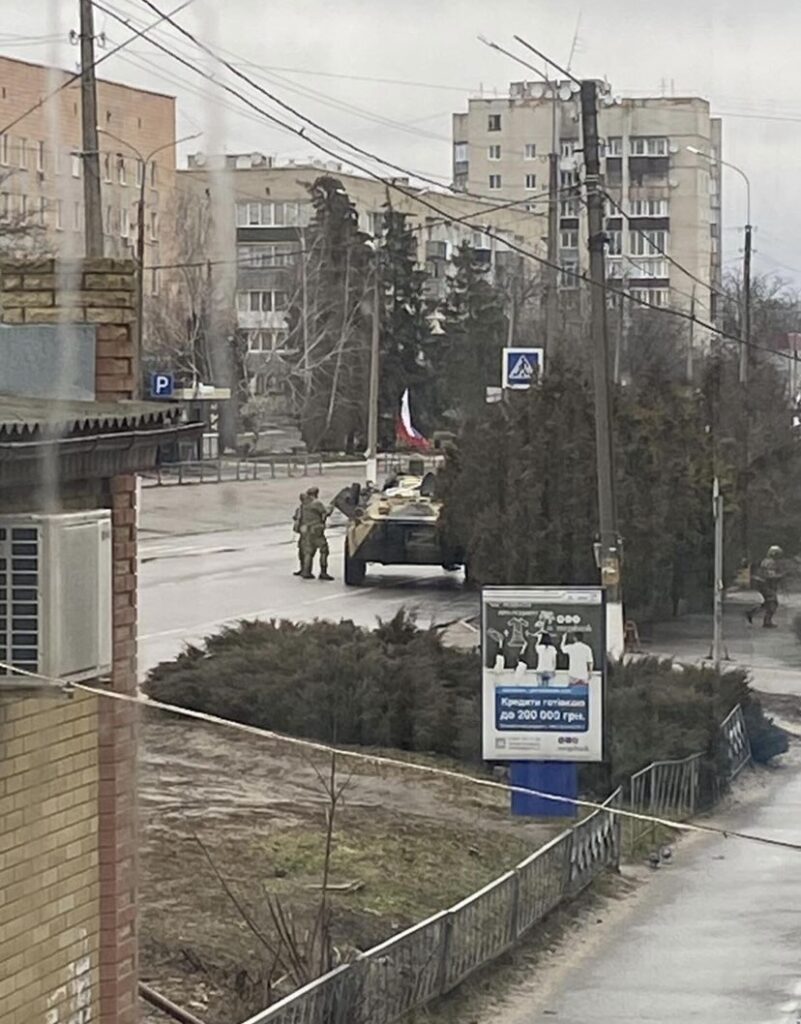
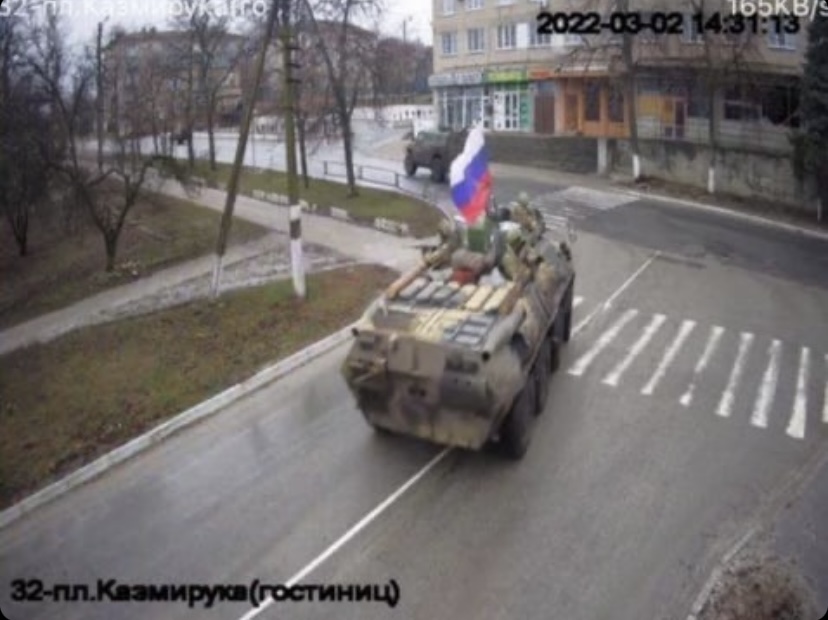
The psychological state of a civilian after constant shelling
At the moment when the shelling begins for the first time and lasts for a long time, it’s as if your body is being preserved. That is, you start to slow down and your perception of everything around you slows down. At this moment, because of fear or I don’t know why, it’s as if a lump is forming in your stomach. You do not want to eat, people around you say something, you hear it but do not perceive anything. It’s like you’re walking on autopilot.
https://youtu.be/qvsI3MqJhZ4
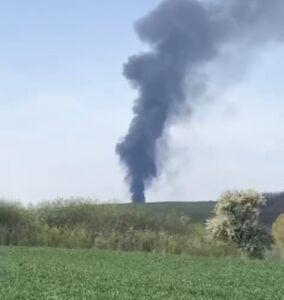
Different perceptions of what is happening by different generations, but bombs from aircraft put everything in its place
At first, everyone was afraid and confused. At the beginning of the war, my wife and I (we are about 30 years old), our 6 year old child, my parents who are about 50 years old and my 75+ year old grandmother were all in the same house.
Perception of a child who was told that the drill had begun
Since we didn’t know how the child would react to the fact that the war broke out, from the invasion and until we left the occupied territory for a safer part of the country, we said that it was a drill. And the fact that shells exploded loudly and the house trembled was because the drill was close to reality, so that we’d know what to do if a war started. And the child took it with full understanding. We explained that real shells were flying, so we needed to hide as soon as the shelling began.
My perception and that of my parents
Confusion and complete lack of understanding of what to do. Soaking up all the information you can find about what’s going on. For example, I understood that not all the information that was presented was valid and I read it solely in order to understand at least some part of what was happening, in order to occupy myself with something in this way. However, my mother and wife, after they’d see information on the Internet and watch all the TV channels, would bring themselves to the stage where their hearts and heads would begin to hurt from worrying. That is, after waking up, they consciously read and watched everything as much as possible. They’d become ill because of the nerves and they took pills to come to their senses. Fortunately, my father noticed this pattern after a short period of time and in an orderly tone explained that there was no need to watch TV and read news on the Internet. He replaced the information about the war with channels about cooking and recipes on the Internet, which helped them calm down and not end up in a nervous state into which they’d drive themselves.
The support of loved ones and the understanding that people can slow down and be afraid are very important. At one of the moments when I was on the street, it was as if a shell had exploded above my head. I say as if, because I did not see it, but I was so frightened by this sound and the shock wave, that for several days I walked kind of slowed down, and I dragged everyone to the cellar at every occasion, even when there were no air raids. No one argued with me about it those days, and everybody empathized with my feeling of excessive concern, if this word is appropriate here. About three days after that, I came to my senses and began to feel better and was able to continue to perform normal tasks around the house.
Perceptions of grandparents
They all seemed to be in cahoots. I have two grandmothers and a grandfather in their seventies, and you’d hear the same things from them along the lines of “we are already too old to hide and we are not so scared and whatever God has set aside for us is so destined and we won’t run 20 times a day to the basement, our legs are no longer fit to run like that.”
Bombs from planes
When they start shooting from cannon artillery and it explodes somewhere nearby, after 7-10 days you get used to it. When grads/hurricanes/smerches (russian multiple rocket launchers) begin to fall, it is very scary, but somehow still tolerable, if this word is appropriate at all in such a situation. But the worst thing is when the Russians drop bombs from planes. If I’m writing this, it means they didn’t throw them directly at the place where I was. But even considering that they bombed nearby, it’s very scary. First there is a characteristic sound of a jet plane flying, then an explosion happens and it even throws you up. Chandeliers shake, and because of the shock wave, it’s as if the skin of your face is separated from the bone.
And now, after the first such bomb, everyone flew like a bullet (ran very quickly) into the cellar. Even my grandmother, who is over 70, ran like in her youth, despite her age.
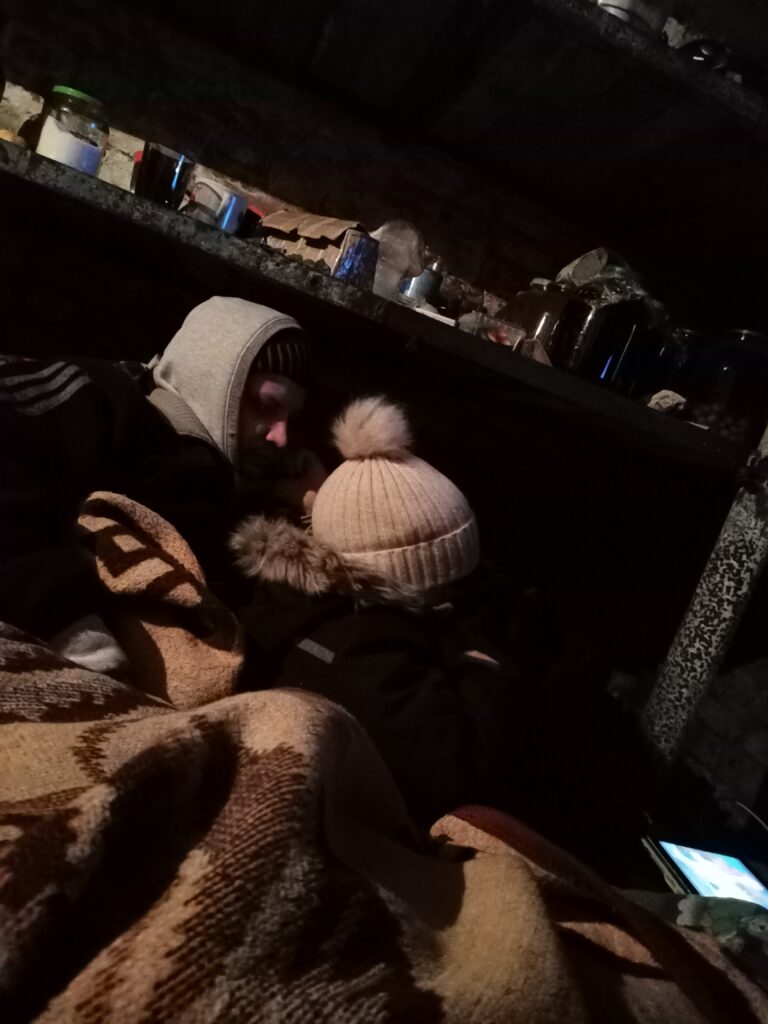
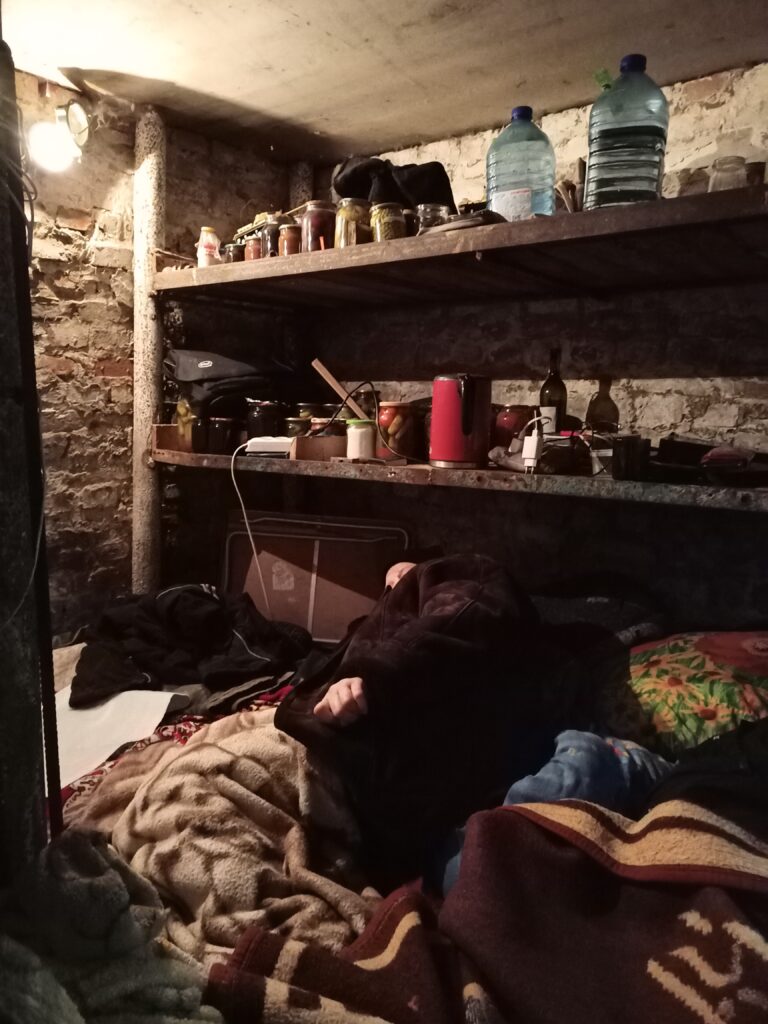
Illusion of safety
I don’t know how the human psyche works, but you’re trying to find a safe place where you can relax and sleep. When we spent the night in the house, someone was on duty and did not sleep. And as soon as heavy shelling began and the planes were somewhere nearby, the person on duty would wake everyone up and we’d run to the basement. Since at that moment I was most worried about the child, therefore, I took this too seriously and therefore I was mainly on duty. After a week of such duties, it got to the point that I could only fall asleep in the cellar. Although I clearly understood that if a shell or rocket hits, then the cellar would not protect much. But I convinced myself and my family that the cellar was the safest place and it would protect us, and began to get enough sleep. Thus, I was able to stabilize my psychological state. At the beginning, when I took the child in my arms, the first 40 times I did it the older generation (50+) teased me and said that I was exaggerating. When Russian planes dropped bombs for several nights straight, they themselves came running and with time everyone began to sleep in the cellar.
https://youtu.be/3AkL7TdgMM4https://youtu.be/daT93NLDZXk
What life under shelling becomes
Life under shelling for a civilian becomes as simple and understandable as possible. In our case, we’d wake up around 5 in the morning (we always slept dressed in the maximum amount of clothes) and go cook right away for a day or two in advance. At about 6:30 we ate and if there was light, we could shower. For a very long time, during the same time around 8 o’clock in the morning, shells and rockets would begin to fly. This was when the Russians had already entered the city. Generally, these were exits (when they were shooting from my town) in the direction of Izyum and in the direction of our military, who were not far from the town on other sides. But because of their incompetency, the shells flew at random and hit near the house. Sometimes they would receive a response.
From 8:00 to 9:30 we sat in the cellar. By 10 in the morning we would go out and do various chores around the house, and by 12 the explosions would begin again. If the explosions were strong, then we’d go down to the cellar. This would repeat throughout the day. The heaviest attacks were mostly from 20:00 to 02:00. It was at night that the planes flew. During intense shelling, the cellar, which you consider the safest place, just shakes and shakes. And if someone starts to panic, it is important to stop it immediately, as the child completely absorbs the state of the people around. One time my wife just wanted to cry because of the whole situation, and our kid immediately began to worry, so everyone always tried to control oneself as much as possible and pretended that everything was in order. I am sure that due to the fact that we controlled ourselves at that moment, the child’s psyche did not suffer much. And this turned out to be important when we moved to a safe area, because the child was able to adapt quickly.
That is, life in the occupation under shelling comes down to waking up, cooking food, eating, waiting out the shelling, reading the news, going to bed. This is provided that you have food supplies, as was our case.
Reference
Our family was lucky because we were in a private house and not in an apartment. And if there was electricity, we could bathe and it’s incredibly great. It’s very bad when you start bathing a child and the shelling begins. And at this moment you are worried that the child does not get sick, because running wet across the street where the temperature is from -5 to + 5 degrees Celsius into a damp basement is not the best idea. After a few of such situations with bathing and shelling, we learned to bathe as quickly as possible, literally in 2 minutes. It has already been 2 months since we left the occupied town, and what brought us the most joy and we even had to get used to was to sleep without outerwear. That is, you just rejoice in that and are happy that you can bathe slowly and you can just go to bed naked.
Self-organization and people’s attitude
After the war came to Ukraine, people began to help each other like never before. This was palpable in everything.
The importance of money and its form
Money is of great importance only in the form of cash. And it becomes very important if you plan to leave. There were no evacuations or green corridors, and if you didn’t have your own car, then there were people who were ready to take you out of the town for relatively high prices. On average, the cost ranged from 2,000 UAH ($67) to 7,000 UAH ($237) per person. People took children for free or at half price. Plus, people were leaving without a specific destination, just to a place where there was no shelling, and they were afraid to come without money and end up on the street without the opportunity to buy food for themselves. And all this was happening in March, when the temperature outside at night dropped to -14°C. Therefore, without having at least some reserve of money for rent and food, or at least an understanding of where to go, people were afraid to leave. It is completely understandable that people take money for helping to leave, since they risk not only falling under artillery or rocket fire, but they can simply be shot by the Russians or put in a basement. You can literally save several lives right now by donating directly to a family that is under occupation, under shelling. No matter how scary it is, a few hundred dollars can save someone’s specific life in Ukraine.
Money and commodity money relations
After the occupation, you cannot withdraw money from the card anywhere. And I had to look for someone who could help cash out the money. They would do it roughly at a 30% fee of the cost, and this is relatively problematic. Money becomes not so important, and the calculation turns into a commodity exchange format. For example, you give me bread, and I give you canned meat. It is more important to have the most necessary goods than money.
The most necessary products and items that a civilian needs during the war, if you stay in your city and do not leave:
Gas
Gasoline is like gold during the war. The situation came to the point that people had cars, but there was no gas to leave, and at some point there were a lot of cars that were not refueling. Therefore, if you have a supply of gasoline, it will help you to group with other people to leave.
The second important point about the availability of gasoline is the ability to go get food. When the villages around the town began to be bombed, the farmers understood that they could not save the chickens, which were grown for sale in thousands, so they simply opened their farms and passed the information on to everyone to come and take as much as they want and are able to take away. And other people who can be called volunteers understood that many could not come, so they went, took live birds and brought them to stores, and people came to stores and could take 4-6 chickens per family for free. It helped a lot. But where I’m getting with this is if there is gasoline, you can negotiate with someone, even if you don’t have a car to go get milk, meat and other products. Another important factor is that the availability of gasoline allows you to use it for generators and get electricity to charge your phone. We charged our refrigerator a little to extend the shelf life of food.
Flour, yeast, grain
Flour disappeared from store shelves very quickly. In our case, we were lucky that there was wheat, which was fed to domestic animals and could be ground into flour. At some point, yeast became one of the key products and everyone just dreamed of finding yeast to make actual bread.
Oil
Since money was no longer important, the stocks of oil that were made before the war helped our family exchange it for other goods and food.
Cigarettes
Cigarettes are in fact almost an alternative to money. Even if you don’t smoke, it’s a very good idea to have a few packs of cigarettes in reserve. Their liquidity becomes almost equal to money.
Matches and candles
The cost of a box of matches in Ukraine is 0.5 UAH ($0.017), but when the town is occupied and there is no electricity, the price for a box of matches rises to 30 UAH ($1.01). After a while, matches appeared and the price stabilized, but matches are one of the most important items. The second important one is candles. When you sit in a dark, damp cellar without light, candles help to add comfort in the form of light and even give a little warmth.
Electric heater
In March, when the war came to my town, the temperature at night dropped below 5°C, but I clearly remember the day when the temperature dropped to -14°C. And the heater miraculously saved us and we had power. That is, the power often disappeared, and the shells interrupted the wires and broke the transformers, but people united and found electricians who could repair and somehow reconnect the wires so that the light was on.
I understand that I was lucky and many people have been to hell compared to me (Mariupol, Bucha, Izyum and other places), and it was as if I was just at a resort compared to them, since there was both electricity and gas for a long period of time and even the Internet, but I am telling my real story as it was with me and do not try to show or embellish or add tragedy to the situation. It’s just that God made it so that my family was safe and we had that on my street, although the neighboring ones didn’t.
Illusion of a little more, and it will all be over
When you’re a civilian and you’re in a town where shells are coming in, you want to believe that everything is about to end. A little more and everything will stop and everything will be as it was before. And they won’t shoot and the Russians will leave and everything will be fine. This is how you subconsciously think when you are there in the moment. And leaving under shelling is very scary, because for some reason you think that your basement is the safest place on the planet. This illusion is what prevents people from dropping everything and leaving. The second point that I wrote about earlier is that people have nowhere to go and there is no normal supply of money, and they understand that no one needs them and there are millions like them. Initially, because of these reasons, we ourselves decided to stay. But when the shelling intensified in March, the power went out, it was very cold and there was a clear understanding that if we didn’t leave, the child would get sick for sure. And in this case, it is completely unclear what to do. This was the main reason why we decided to leave. And literally, by some miracle, the next day, my own uncle said that he would be driving his daughter and wife out of town and could pick me, my wife and child up.
https://youtu.be/S7fHxeEOmQQhttps://youtu.be/1ykI2-DV3Mk
Leaving town
On the day we decided to leave, rockets began to arrive in the suburb of the town where we lived. That morning a rocket hit 700 meters from us and burned down 2 houses. The shelling was so strong that the house simply swayed from side to side. We hadn’t had such fear during the previous period of shelling, since we understood that we would have to leave under shelling, and this caused a very strong fear. And the second strong fear was that in order to leave, we had to pass through several checkpoints of the Russian military. We knew that they could check phones, so we removed all the information that could somehow potentially annoy an 18-year-old bastard who felt power and with a machine gun in a foreign land handed to him pokes it at you and at your family.
We were leaving in three cars, two were my uncle’s and one of a neighbor. It was important to go together as it was necessary to take detours to avoid entering Russian-controlled territories and to minimize the chance of driving on roads that could be shelled.
We hung white cloth on all 3 cars. They hung on the side mirrors and antennas, and we wrote the word children. And we left. We had to pass three Russian checkpoints to get to the territory where ours were already stationed. Behind the wheel of one of the cars we were driving was my uncle’s wife. Although Balakliya is considered a Russian-speaking town, she herself is from central Ukraine and speaks Ukrainian. Our car was stopped, and when these 18-20-year-old military men began to wave their machine guns at us, she started to panic because of her nerves and she asked the question in Ukrainian: “Guys, what are you doing here and what have you forgotten here. No one called you and why did you come here.” Only one of the three understood a little bit of the Ukrainian language, the other two did not understand at all what she was saying exactly, and were shocked how the girl could resent them with disdain and curse them, even while a machine gun was pointed at her, and she answered: “What are you pointing your gun at me for, I’m not afraid of you. You are in a foreign land. Shoot if you want, if not, then put the machine gun away and don’t point it at me.” We barely calmed her down so that it would not turn into something terrible. They searched the cars in detail and let us through. This checkpoint was next to the hospital that was bombed. We passed the second checkpoint normally, but at the third checkpoint we were superficially inspected and we drove across the bridge. When we passed, the entire bridge was mined in anti-tank mines. They stood in a row and a little to the side so that a car could pass. When we reached our checkpoint, we exhaled for the first time in a day. Then for 10-15 minutes we drove at a maximum speed of around 200 km/h in order to leave the zone where Russian shells could reach as quickly as possible.
Volunteers
I had never seen such a unification of people before February 24, 2022. Since there was a curfew in the country, we had to make a stop to spend the night. In one of the towns of Poltava oblast, we learned from acquaintances that we could stay and spend the night on the premises of a school. We were fed for free and provided beds with clean linens. I remember the stark contrast between Balakliya and Andriyivka. The distance between the cities is only 10-15 km, but it’s as if you are already in another world where you can normally buy groceries, pay with a card, and the stores have everything you need.
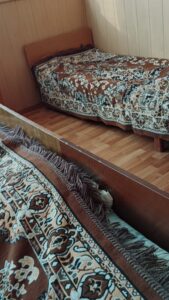
Humanitarian aid in occupied cities as experienced in my town
It’s just something. Do you know what kind of humanitarian aid was handed out to people? In the middle of March, in the town of Balakliya, Kharkiv oblast, there was a rumor that humanitarian aid was being distributed. Many people went in the hope that they could get some food. As a result, one glass of beans per family and 2 diapers each if you have babies were distributed! One 200 gram glass of beans for an entire family! It is impossible to survive on this humanitarian aid. Perhaps those were private individuals who wanted to help other people, I don’t know, but the fact remains. People in Ukraine who have suffered really need your help. Indeed, because of the war that Russia has unleashed against Ukraine, many families need money for food and basic hygiene items. Support families directly, they will never forget you and will be very grateful to you and remember you all their lives.
Today it is very difficult for people, and especially families with children, to survive in the occupied and front-line towns. It is also very hard for people who have just arrived from the war zone. It took me about 2 months to recover.
Glory to Ukraine! Thanks to people from the U.S. and around the world who are now helping people survive during the war in Ukraine.
Tips from a person who was in the city under shelling and occupation:
Hygiene and general well-being
- If you feel that you are starting to slow down and you seem to have a glassy look and feel heaviness, the best and only way to recover is to go shave, wash up, shower, brush your teeth. That is, do everything possible in order to feel like a person. I don’t know how or why it works, but it works. Perhaps due to the fact that before that you lived in the basement for several days or weeks and slept wearing clothes all the time. Since any arrivals of shells that occur next to you, you immediately run to the basement/cellar. Take care of foot hygiene. It is not always possible to bathe, but if possible, wash your feet. For most of us, not doing this caused our feet to crack.
Leave as soon as possible
- There is a risk of falling under shelling when leaving, but it is better to survive this for several hours than to live under shelling for weeks and months. Please accept that the war can last months or years, and make your decisions based on that.
- Don’t be afraid to leave without money. In Ukraine, there are a large number of places based at schools where you will be accommodated in comfortable conditions, provided with clean bedding, free food and medical care. All information can be found through volunteers or on the Internet.
- Remove from your vocabulary the argument that there are explosions everywhere and there is no safe place and therefore I’d rather stay at home. This is not true! It’s one thing when a rocket can potentially fall, but it doesn’t fall everywhere, and another thing when you are under artillery and rocket fire for several hours a day.
- Remove the argument of “what’s there to bomb here, we have a small village, there is nothing of interest here and there are no military men, so we will not be bombed”. It’s not like that at all! The Russians drop bombs from planes on the smallest villages and shell everything in their path with multiple rocket launchers. In general, there is no pattern. They just destroy everything for no reason.
If you decided to stay
If you have finally made a decision to stay, stock up on the most necessary food items and medicines for several months. Don’t be afraid to spend all your money on the most important things. At the first opportunity, cash out enough money to survive for a few months.
- Never give all the documents to one person, especially if this person leaves the apartment from time to time. Keep documents and money separately among yourselves. This is important, because if the Russians take away one of the family members, the rest will end up without money and documents, they will not be able to leave, even if they want to.
- Pack your bag, even if you don’t particularly want to leave. If, God forbid, shells start falling next to you and your opinion about evacuation changes dramatically, you will be ready for this and will be able to do it right away.
- If you have children, do not show your anxiety. As soon as you stop controlling yourself, it immediately affects the children and they will repeat your reaction. When heavy shelling begins and the cellar trembles, if you calmly react to this, then the child may even try to sleep. And if you cannot control yourself, then the child begins to panic and act hysterically, and no one benefits from this.
- I can’t say that this is advice, but when the war started, we told our child that this drill was close to reality: they are shooting with real shells, so you need to be careful and it’s important to hide. In my case, this helped, and the child did not ask questions about death and whether we would die. It is impossible to hide it now, when the war is very long, but at the beginning I think it helped the child to avoid additional stress.
- In a confined space and because of constant nervous tension, people can break down because of all sorts of little things. People don’t do it on purpose, so don’t take anything they say personally. This is how they try to relieve nervous tension on someone. If this happens, understand that this is stress and do not react to it seriously.
- Prepare a place where you are going to hide from shelling not with chairs to temporarily wait it out, but with sleeping places. Shelling can be at night, lasting for 6-8 hours and for several weeks in a row. Therefore, it is better to sleep at this moment than to sit uncomfortably. And for some reason you really want to sleep. I don’t know why, but it is so. One just wants to sleep all the time because of stress.
- Don’t read the news all the time and don’t watch TV all the time. A lot of people make themselves nervous because of this. You are only making things worse for yourself. Spend no more than 1-2 hours a day on this.
- Get all possible medicines as soon as possible. Medicines become scarce. Everyone knows what their potential problems are, yet think about medications not only for yourself, but for all your relatives.
